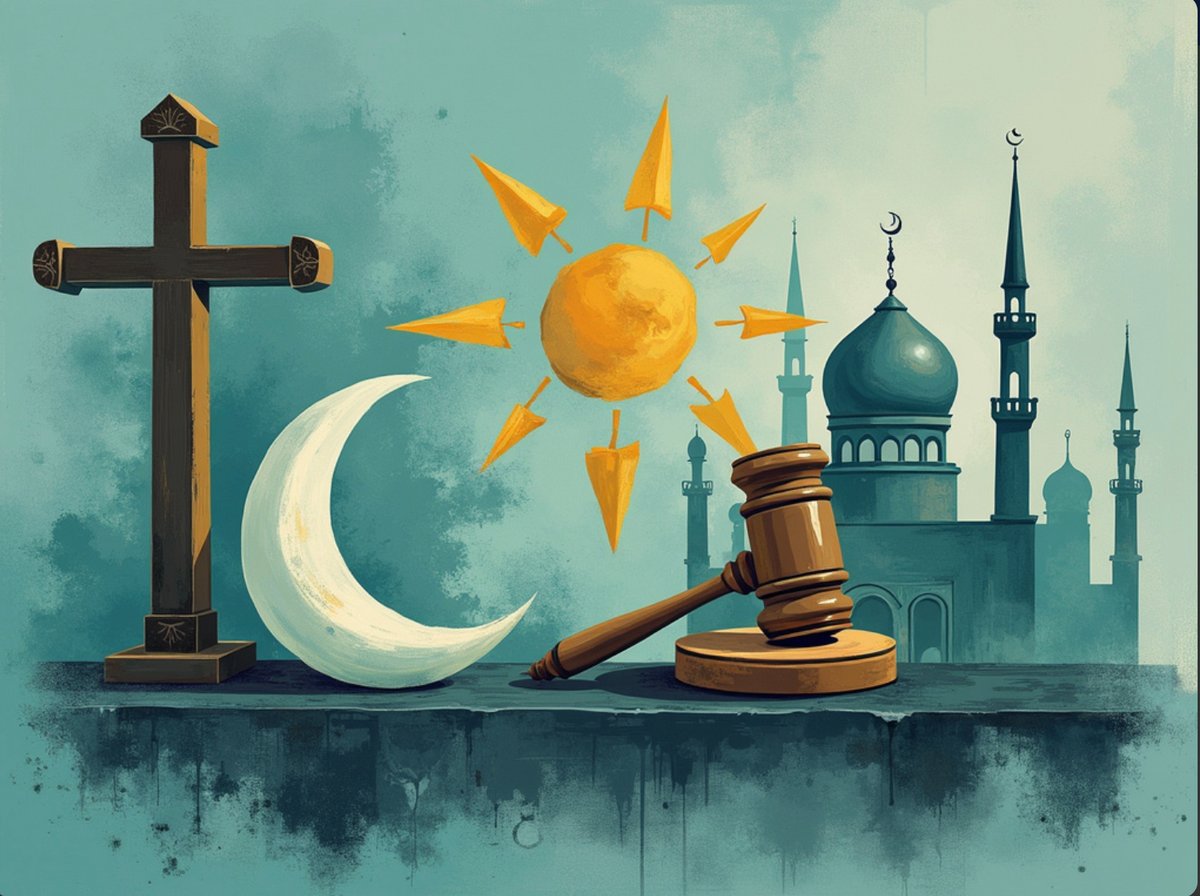

By Dr. Tim Orr
In today’s polarized world, discussing religion, particularly Islam, has become increasingly fraught. As we grapple with the nuances of religious critique of Islam, we find ourselves facing two distinct yet interconnected challenges: the enforcement of blasphemy laws in some Islamic countries and the growing accusations of Islamophobia in the West. Both approaches aim to shield religious sensitivities but do so differently, impacting our ability to engage in open, critical conversations. Let's explore how these dynamics work and affect discourse and academic freedom.
Islamic Blasphemy Laws: A Historical and Practical Overview
Blasphemy laws in many Islamic countries aim to protect Islam from criticism by upholding the sanctity of its prophets and sacred texts. While the Qur'an emphasizes respect for Allah and the Prophet Muhammad (Qur'an 33:57), it does not provide a detailed legal framework for dealing with insults. Instead, Hadith offers specific guidance, sometimes resulting in severe penalties like death (Ibn Hanbal, 2004). Historically, these laws were implemented to protect the integrity of the Muslim community and prevent internal discord. For instance, the 9th-century scholar Al-Maturidi argued that blasphemy undermined the social fabric of the Muslim ummah (community) and could incite violence and disorder (Beyer, 2006). Contemporary enforcement varies but often includes severe punishments, reflecting the tension between religious respect and freedom of expression (Cook, 2000).
The Rise of “Islamophobia” (Western Blasphemy Laws) in the Western Context
The concept of Islamophobia can be argued to have been promoted by Islamist groups as a form of Western blasphemy law intended to silence any criticism of Islam by labeling it as discriminatory or bigoted. This perspective suggests that the term "Islamophobia" is strategically used to deter open dialogue and critique about Islamic teachings and practices by equating such criticism with racism or xenophobia.
In contrast to Islamic blasphemy laws, which are legally enforced in some Muslim-majority countries and carry severe penalties for those who insult or critique Islam, the approach in Western societies often relies on social, rather than legal, mechanisms to suppress criticism. This includes public condemnation, social ostracism, and accusations of bigotry, which can lead to self-censorship among individuals or institutions.
Historically, Western societies have moved away from formal blasphemy laws to uphold freedom of speech and religion. The decline of such laws, particularly in Europe and the United States, reflects a broader commitment to secularism and individual rights. In the U.S., for example, the First Amendment guarantees the right to free speech, including the right to criticize religion without fear of legal repercussions.
The use of Islamophobia as a concept, therefore, can be seen as a modern, socially-enforced blasphemy law designed to protect Islam from criticism in a way that parallels, though does not legally enforce, the restrictions seen in Islamic blasphemy laws. This dynamic underscores the ongoing challenge in balancing the protection of religious groups from genuine discrimination with the preservation of free speech and open critique of religious ideas.
The term "Islamophobia," while intended to address prejudice and discrimination against Muslims, has been critiqued for stifling legitimate criticism of Islam. Critics argue that the term "Islamophobia" was created with the specific intention of stifling dissent by labeling it as racist, xenophobic, or bigoted (Yasmine, 2023). The effectiveness of this tactic is amplified by mobilizing individuals who may not be directly involved in Islam or Muslim communities to enforce silence on critical discussions. This results in a broader, unintended suppression of legitimate discourse about Islam. For instance, the controversy surrounding the publication of cartoons of the Prophet Muhammad in Denmark led to widespread protests and accusations of Islamophobia, stifling open discussion on the issue (Holt, 2017).
In the contemporary Western context, accusations of Islamophobia can exploit cultural and political sensitivities. By branding criticism as "Islamophobic," it capitalizes on the Western emphasis on multiculturalism and anti-discrimination, thereby manipulating these values to protect the religion from critique (Yasmine, 2023).
The “Woke” Movement and Its Impact
The “woke” movement, focusing on social justice and protecting marginalized groups, adds another layer to this debate. While the movement intends to address injustices, it sometimes leads to censorship, where even well-intentioned critiques are labeled offensive. This can stifle honest dialogue about religious beliefs and practices (Yasmine, 2023).
The concept of “wokeness” often emphasizes the need to be sensitive to various groups' historical and ongoing discrimination. However, this sensitivity can sometimes lead to valid criticisms being preemptively dismissed as prejudiced. For example, discussions about practices such as female genital mutilation or forced marriages within particular communities can be stifled if they are perceived as attacks on cultural or religious practices. This can create a paradox where the goal of protecting marginalized communities inadvertently leads to suppressing essential conversations that could lead to positive change.
Scholarly Reinterpretations and Avoidance of Critique
Adding to the complexity, some many scholars of Islam aim to reinterpret the religion in ways that align with contemporary values such as liberalism, inclusivity, and feminism. Aaron W. Hughes points out that these scholars often focus on portraying a “good” Islam that fits modern ideals, sometimes avoiding critical discussions of traditional teachings to maintain a positive image of the religion (Hughes, 2013).
This reinterpretation effort, while well-intentioned, can result in a skewed understanding of Islam. By emphasizing certain aspects of the religion that align with current liberal values, such as gender equality and pluralism, scholars may inadvertently obscure or downplay more controversial elements. For instance, focusing on progressive interpretations of the Qur'an might overlook traditional practices at odds with modern ideals. This selective approach can lead to a lack of comprehensive understanding and hinder meaningful critique, ultimately failing to address the full spectrum of issues within the religion.
The Challenge to Academic Freedom
Both Islamic blasphemy laws and Western accusations of Islamophobia pose significant challenges to academic freedom and open discourse. While Islamic blasphemy laws use legal penalties to enforce silence, accusations of Islamophobia rely on social pressure. Both approaches can inhibit the free exchange of ideas and critical examination of religious beliefs. The work of scholars like Edward Said, who critiqued Western studies of Islam for perceived biases, underscores the tension between academic critique and cultural sensitivity (Said, 1978).
Academic freedom is crucial for the advancement of knowledge and the fostering of critical thinking. However, legal or social pressures suppressing certain viewpoints can lead to a narrowed scope of academic inquiry. The chilling effects of both blasphemy laws and accusations of Islamophobia illustrate the difficulties faced by scholars and commentators trying to engage with sensitive topics. Ensuring that debate remains open and inclusive is essential for a vibrant intellectual community where diverse perspectives can be explored and discussed.
Conclusion: A Call for Open Dialogue
As we navigate these complex issues, it’s crucial to balance respecting religious sensitivities, upholding the principles of open dialogue and academic freedom, and understanding how blasphemy laws and accusations of Islamophobia function can help us foster an environment where honest, respectful conversations about religion can thrive. Let’s work towards a world where we can engage with each other’s beliefs and practices thoughtfully, without fear of censorship or reprisal. Legal or social pressures should not hinder the pursuit of knowledge and understanding but rather be encouraged through open, respectful discourse.
References
Beyer, P. (2006). The Changing Role of Islam in the Muslim World. Cambridge University Press.
Cook, M. (2000). The Koran: A Very Short Introduction. Oxford University Press.
Holt, P. M. (2017). The Western Imagination of the Islamic World. Palgrave Macmillan.
Hughes, A. W. (2013). The Study of Islam: A Critical Introduction. Columbia University Press.
Ibn Hanbal, A. (2004). Musnad Ahmad ibn Hanbal. Dar al-Kutub al-Ilmiyya.
Said, E. W. (1978). Orientalism. Pantheon Books.
Yasmine, N. (2023). Islamophobia and Its Discontents. Routledge.
The concepts in this article are mine, with AI assisting in its creation.
My Series for Bengali Christians

Latest Articles



Sign up for Dr. Tim Orr's Blog
Dr. Tim Orr isn't just your average academic—he's a passionate advocate for interreligious dialogue, a seasoned academic, and an ordained Evangelical minister with a unique vision.
No spam. Unsubscribe anytime.
